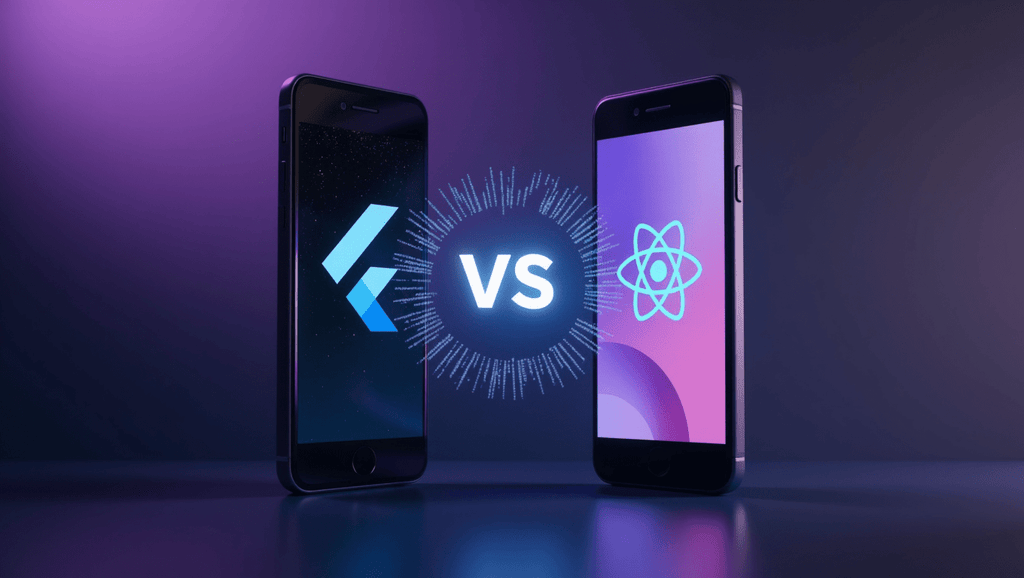Choosing the right technology stack is one of the most critical decisions you'll make for your business's mobile app. In 2025, the debate between the two leading cross-platform frameworks, Google's Flutter and Facebook's React Native, is more relevant than ever. Both promise to reduce development time and cost, but they achieve this in fundamentally different ways. This guide provides an in-depth, balanced comparison to help you decide which is the perfect fit for your project.
What is Flutter?
Flutter is an open-source UI software development kit created by Google. It allows developers to build natively compiled applications for mobile, web, and desktop from a single codebase. Its core selling point is its use of the Dart programming language and its rich set of pre-designed, customizable widgets, which allows for fast, expressive, and beautiful user interfaces.
What is React Native?
React Native is a framework developed by Facebook that enables developers to build native-style apps using JavaScript and React. Its primary advantage is its ability to use native UI components, which can give your app a look and feel that is perfectly consistent with the platform (iOS or Android) it's running on. For businesses with existing web development teams skilled in JavaScript, the learning curve is often much smoother.
The Head-to-Head Comparison: Flutter vs. React Native
Let's break down the key differences that matter most to business owners and project managers.
| Feature | Flutter | React Native |
|---|---|---|
| Programming Language | Dart | JavaScript |
| User Interface (UI) | Renders its own widgets, offering a highly branded and custom UI. | Uses native OS components, providing a true native look and feel. |
| Performance | Excellent, often near-native speed due to direct compilation to native code. | Very good, but relies on a JavaScript bridge which can be a bottleneck in complex apps. |
| Development Speed | Extremely fast thanks to Hot Reload, a rich widget library, and a single codebase. | Fast development, especially with code sharing from React web apps and Hot Reloading. |
| Community & Ecosystem | Growing rapidly with strong backing from Google. More packages are being added daily. | Mature, vast community with a massive library of third-party packages and resources. |
UI and User Experience
Choose Flutter if: You want a highly customized, brand-centric design that looks identical on both iOS and Android. Its widget-based system allows for complex, beautiful animations and a unique brand identity.
Choose React Native if: Your priority is an app that looks and feels exactly like a native app on each platform. By using the host platform's UI components, it guarantees that your app will automatically adapt to the user's OS.
Performance
Choose Flutter if: Your app is graphically intensive, involves heavy animations, or requires consistently high performance. Flutter's direct compilation to native code gives it a slight edge in raw speed.
Choose React Native if: Your app consists mainly of standard UI elements, data display, and user input. For most business applications, the performance is more than sufficient and indistinguishable from native apps.
Development Time and Cost
Choose Flutter if: You are starting from scratch and want to build quickly. The extensive library of pre-built widgets can significantly speed up the development process. If your team needs comprehensive support, our expert Flutter app development services can help build and deploy your vision efficiently.
Choose React Native if: You have an existing team of JavaScript or React developers. Leveraging their existing skills will drastically reduce the learning curve and, consequently, development time and cost.
Conclusion: Which is Best for Your Business in 2025?
The "best" framework truly depends on your specific business needs:
- For a highly branded, visually unique app with demanding performance, Flutter is likely the superior choice.
- For an app that needs a strict native look and feel or if your team is already proficient in JavaScript/React, React Native is an excellent and practical option.
Both frameworks are powerful tools capable of building amazing applications. The key is to align the framework's strengths with your project goals, budget, and team's expertise.
Ready to Build Your Next Mobile App?
Whether you've chosen Flutter, React Native, or need expert guidance to make the right decision, our team is here to help. We translate business goals into high-performing, scalable mobile applications that drive growth.
Start Your Project with an Expert Today

 PKR
PKR TRY
TRY